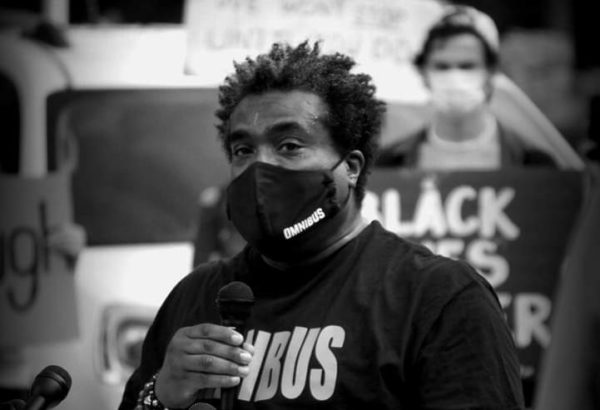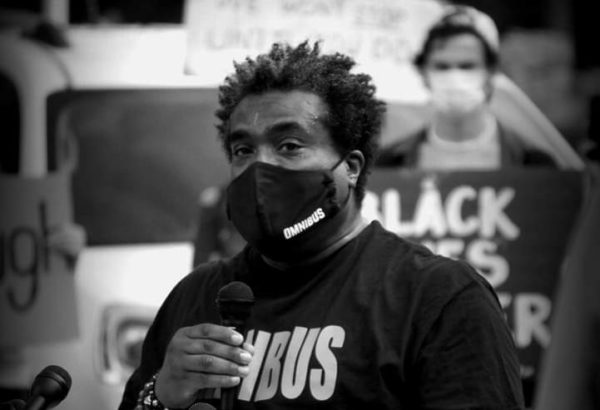North Carolina Black Fighters Vindicated After Study Confirms Racial Tensions Exist Within Fire Department
A group of Black firefighters in Winston-Salem, North Carolina, who spent much of the summer calling out racism in the city’s fire department felt vindicated by a cultural assessment report released last week.
The 20-page report, completed by a Charlotte-based race relations specialist, found no evidence that the Winston-Salem Fire Department is a racist organization. But it did cite existing racial and cultural tensions within the department.
“We are glad that they actually found out that there’s racism and that there are racists within the department, which is what we’ve been saying,” said Thomas Penn, a leading member of Omnibus, a group of Black firefighters in Winston-Salem that has lodged a grievance against the Fire Department. “We never said the Winston-Salem Fire Department was a racist organization. We said there are racists within the organization, and we actually named those individuals that we think are prime candidates for removal.”
Omnibus formed in June and began publicly petitioning for sweeping reforms a month later, calling for several top-ranking Fire Department officials to be terminated. That included Fire Chief William Mayo, who the group said allowed a culture of hazing, intolerance and racial hostilities to fester inside the department for years without taking action.

Winston-Salem City Council hired WPR Consulting for $20,000 in August to address the allegations of systemic racism. The Black-owned diversity-equity consultant performed an assessment of the fire department’s racial climate.
The report laid out 19 reccommendations to alleviate that climate of hostility in the department.
“The WSFD, in and of itself, is not a racist organization,” it concluded. “However, there are individuals who are employed by the department who are viewed as racists. Multiple fire service staff — both Blacks and whites — who participated in the focus group discussions, alleged that racism and discrimination occurs in the department.”
WPR presented its findings to city leaders during Winston-Salem Public Safety Committee meeting Jan. 11.
“We take allegations of racism extremely seriously,” said City Councilman James Taylor, the committee’s chairman. “Especially considering the climate in America today, we wanted to make sure we’re leading from the top and leading from the front.”
WPR studied the culture of the department, reviewed ethnic demographics of the city’s workforce, conducted a SWOT (strengths, weaknesses, opportunities, threats) analysis and sought to develop a comprehensive “diversity, equity and inclusion” (DEI) training model.
WPR interviewed over 100 firefighters, employees from City Manager Lee Garrity’s office and members of the city’s Human Resources department via in-person and virtual focus groups. Omnibus members along with NAACP, the Urban League and other local social justice groups were invited to share their perspectives.
The company also reviewed social media posts on firefighters’ personal pages, read documents and news articles detailing the ongoing clash, and examined the WSFD’s history.
Omnibus filed a grievance in October that alleges top-ranking members of the city’s fire department have allowed a culture of systemic racism to fester throughout the ranks. The group of current and retired firefighters claim they’ve been subjected to years of racist and inappropriate comments in person and via social media.
Their grievance detailed such instances as a gorilla mask being left on a Black firefighter’s desk. In 2019, a white firefighter tied a noose during a ropes training course and dangled it in front of a Black fireman. Mayo never addressed the incident or reprimanded the officer who pulled the stunt.
The climate study was a comprehensive look into the overall department and not an investigation into the specific claims laid out by Omnibus. Assistant City Manager Damon Dequenne said the city attorney’s office and HR department are working to handle those grievances.
The climate study did touch on one of Omnibus’ central concerns, indicating that no personnel corroborated the group’s claim that Mayo is racist. Penn, a 28-year veteran of the WSFD, adamantly disagreed with that assessment.
“Because when you condone racist acts, you overlook racist acts and you actually try to minimize the racist acts of others, to me that classifies you as a racist,” he said to Atlanta Black Star. “I think it was just the city’s effort to save Mayo. But we’re not satisfied with that. We think we have poor leadership, I think we do have racist leadership, regardless of how the numbers stack.”
Omnibus also listed also several racially tinged social media postings made by high-ranking fire captains over the summer, including one who implied he would run over social justice protesters.
The group demanded Mayo and four white fire captains — Kelly Black Jernigan, Kevin Shore, Christopher Belcher and Edward Blair — be fired for fostering the hostile work environment.
The climate assessment catalogued more than 30 of the department’s achievements on the racial and diversity forefront. WSFD boasted North Carolina’s first integrated “fire company” in 1951 and the department fully integrated in 1967. A Winston-Salem public safety officer became the state’s first paid woman firefighter in 1973. Penn noted she was a white woman. The report also noted that four of Winston-Salem’s six fire chiefs since 1980 have been Black, and minorities currently make up 55 percent of the WSFD senior brass.
WPR listed efforts the department has made to foster diversity in hiring since 2015 and chronicled a number of groundbreaking promotions for minorities in that span.
“In our research, we found the fire department to be a very progressive organization that has been a leader in the country when it comes to issues of race and integration,” WPR President Willie Ratchford said during the Jan. 11 meeting.
Omnibus members were puzzled as to why so much of the Fire Department’s history, dating back to the 1950s, was listed in the final report.
“The history is horrible,” Penn said, referring to the generation of Black firefighters who integrated the department. “You had eight black firemen who suffered some of the most egregious acts. … They would ride past and throw their checks in the yard. They weren’t allowed to fight fires in white neighborhoods. I mean, they act as though when those Black firemen were entered into the department that it was all hunky dory. But they suffered.”
The climate study revealed that many of the shifts and fire stations have a racial makeup that’s either all-Black or entirely white. WPR pinned some of that on the geographic divide in the ranks.
Penn explained that many of the white firefighters come from rural communities surrounding Winston-Salem and commute from as far as an hour outside the city. Most of the Black officers, meanwhile, live inside the city limits, which has a much denser African-American population.
The consultant recommended the WSFD make a more concerted effort to diversify shifts and make races work together across all fire houses.
Facebook proved to be a driving factor in the racial tensions, according to WPR’s findings. While some in the department viewed them as First Amendment expressions, others perceived them simply as racist.
WPR suggested the city review and re-strengthen its social media policy for employees. Dequenne said the city revised the Fire Department’s social media policy in light of the allegations that have come forward in recent months. It now mirrors the police department’s police, according to city officials.
“So it allows for more accountability and ensures that there’s no direct connection between their profession and what they’re posting representing the city,” Dequenne said.
Those suggestions were among a laundry list of recommended solutions WPR proposed to close the fire department racial gap. Others included diversity, equity and inclusion strategies with a corresponding action plan that has measurable goals, “intercultural training” for all department employees, development of an anti-hazing policy, and increased outreach efforts to recruit from diverse areas of Winston-Salem.
The study also suggested a discipline audit be conducted to address a “strong perception” amongst both Black and white firefighters in the department that there’s a disparity in discipline based on race.
Winston-Salem Councilwoman Barbara Hanes Burke called for a citywide DEI, office and Councilman Kevin Mundy asked that the diversity program also focus on sexual orientation discrimination.
“I think the recommendations are great, because they’re ours,” Penn said. “A lot of them are our suggestions that we made when we put forth our demands. We wanted an external investigation. They pretty much touched on everything we asked for with the exception of terminating those individuals — Mayo and the other four.”
Omnibus continues to grow and members were interviewed by city officials for the grievance in mid-December. But since then the investigation has basically stalled.
Despite the slate of proposed changes, Omnibus members still wondered how seriously city officials are taking the situation. Penn indicated he was insulted by Councilman Taylor’s assertion that the city was treating the matter extremely seriously.
“We’ve been screaming this for nearly seven months now, so what’s really the level of seriousness?” he said. “For the study to continuously say that the city is not racist, the Fire Department is not racist, but you have 19 recommendations?” he said. “Nineteen recommendations for a department that you say is not racist? You know, if you say one or two … that is a sign to me that says there is not a problem. But 19 recommendations? And at least eight of those were ours.”

